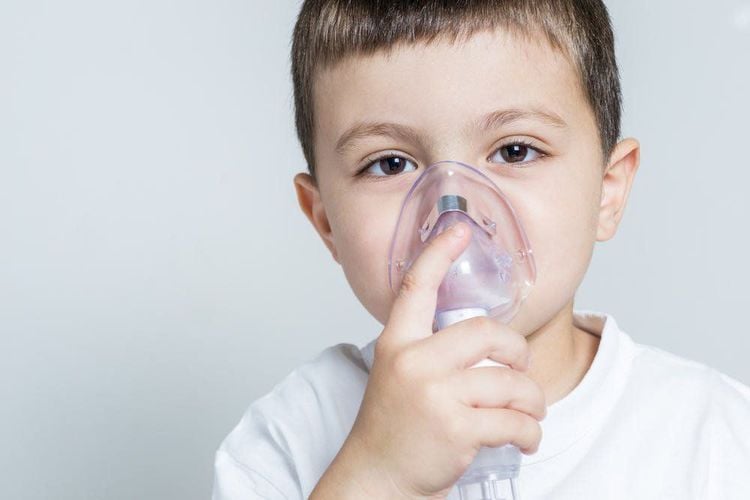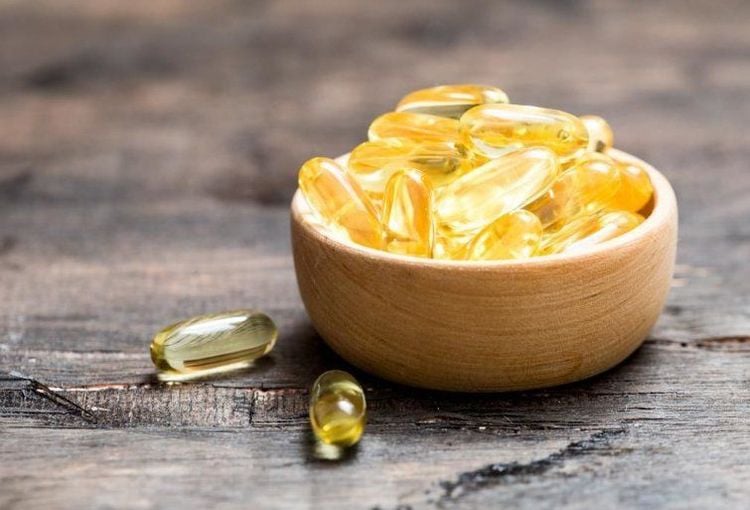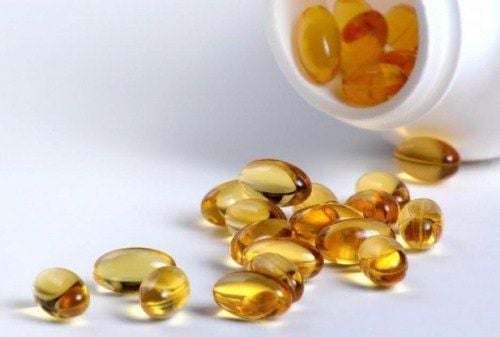This is an automatically translated article.
Omega-3 fatty acids are polyunsaturated fatty acids that have many health benefits, such as heart health, type 2 diabetes, rheumatoid arthritis and depression. They are called essential fatty acids because they are essential for maintaining optimal health, but the body cannot synthesize these acids on its own, so you need to get them through your diet regularly.1. 3 main types of omega-3 fats
There are many fatty acids in the omega-3 family. The most important acids are EPA, DHA and ALA.1.1. EPA (eicosapentaenoic acid) EPA is a 20-carbon long omega-3 fatty acid, mainly found in fatty fish, seafood, and fish oils. This fatty acid has many essential functions. Most importantly, it is used to form signaling molecules called eicosanoids, which work to reduce inflammation. EPA has been shown to be particularly effective for certain mental conditions, especially depression.
1.2. DHA (docosahexaenoic acid) DHA is a 22-carbon long omega-3 fatty acid, primarily found in fatty fish, seafood, fish oils, and algae. DHA's most important role is to form structure in cell membranes, especially nerve cells in the brain and eyes. DHA makes up about 40% of the polyunsaturated fat in your brain. DHA is important during pregnancy and lactation. It is very important for the development of the nervous system of the fetus and baby after birth. Breast milk can contain significant amounts of DHA, depending on how much DHA your body takes in.
1.3. ALA (alpha-linolenic acid) ALA is an 18 carbon long omega-3 fatty acid. This is the most common type of omega-3 fatty acid in the diets of vegans or vegetarians, as ALA is mainly obtained from nuts such as flaxseeds, chia seeds, and walnuts.
Apart from providing energy for the body, ALA does not have many other biological functions. However, they are still classified as an essential fatty acid, because they can convert it into EPA and DHA – two types of omega-3 fatty acids with different biological functions and are essential for a body. healthy and balanced.
The big downside of this transition is that they are very inefficient. It is estimated that only about 5% of ALA is converted to EPA and only 0.5% is converted to DHA. For this reason, ALA should never be used as the sole source of omega-3 supplements. When not converted, most of the ALA you eat will simply be converted to energy just like other fats.
2. Health Benefits of Omega-3 Fatty Acids
Omega-3 fatty acids are among the most comprehensively studied nutrients in the world. The health benefits of omega-3 can include the following:Lowering blood triglycerides: Omega-3 supplements can significantly reduce blood triglycerides. Cancer prevention: Eating foods rich in omega-3s helps reduce the risk of colon, prostate, and breast cancers. However, not all studies are similar in this regard. This means that an anti-cancer effect has only been shown in some studies, while others have found no evidence of this effect. Reduce fatty liver: Taking omega-3 fatty acid supplements can help remove excess fat from your liver. Reducing depression and anxiety: Taking an omega-3 supplement, such as fish oil, may help reduce symptoms of depression and anxiety. Reducing inflammation and pain: Omega-3s may reduce inflammation and inflammatory symptoms of autoimmune diseases such as rheumatoid arthritis. It is also effective in relieving menstrual cramps. Good for Children with Hyperactivity: In children with hyperactivity, omega-3 supplements can significantly improve a variety of symptoms. Asthma prevention: Omega-3s may help prevent asthma in children and young adults. Good for baby's development: DHA supplements for pregnant mothers, nursing mothers and young children can improve their baby's intelligence and health. Improves dementia: Some studies suggest that high omega-3 intake may help reduce the risk of Alzheimer's disease and dementia. Although early omega-3 supplementation reduces the risk of cardiovascular disease, omega-3 fatty acids have not been shown to prevent heart attacks or strokes.

Omega-3 có thể giúp ngăn ngừa hen suyễn ở trẻ em và thanh niên
3. How much omega-3 is needed for optimal health
The World Health Organization (WHO) and the European Food Safety Authority (EFSA) recommend a minimum of 250-500 mg of EPA and DHA compounds per day for healthy adults. The American Heart Association recommends eating fatty fish at least twice per week to ensure optimal omega-3 intake for heart disease prevention.For pregnant and lactating women, these organizations recommend 200 mg of DHA more than the recommended amount for the average person.
The National Academy of Sciences, Engineering and Medicine recommends 1.6 grams of ALA for men and 1.1 grams for women per day
If you are trying to improve your health specifically If possible, consult your healthcare provider for the recommended daily dose.
Remember that if you are taking a high omega-6 supplement, you need an equal amount of omega-3 to balance it out. You should cut back on omega-6 intake to reduce the body's need for omega-3s.
4. Should you take omega-3 supplements with supplements?
The best way to ensure optimal omega-3 intake is to eat fatty fish at least twice per week. However, if you don't eat a lot of fatty fish or fatty seafood, you should consider supplementing with a supplement. In fact, many studies have proven that supplementing with omega-3s with functional foods has many health benefits. The best sources of EPA and DHA supplements are from fish oils and algae oils. For vegetarians, it is recommended to supplement DHA from algae.When it comes to omega-3 supplements, there are many choices and not all of them are good. Some may even contain harmful pollutant compounds. Do your due diligence when choosing products to supplement.

Dầu cá hoặc dầu tảo là nguồn bổ sung EPA và DHA tối ưu
5. Safety and side effects
Adding too much is not always good. As with most nutrients, there are minimum and maximum doses of omega-3s that can provide the most health benefits. Therefore, the right omega-3 supplement also plays an important role.According to the US Food and Drug Administration (FDA), a maximum intake of 2,000 mg of EPA and DHA oral tablets per day from dietary supplements is safe. If taken in high doses, omega-3s have a blood-thinning effect. Talk to your doctor if you have a bleeding disorder or are taking blood thinners.
Cod liver oil is also rich in vitamin A and can be harmful if taken in large doses. Be sure to read and follow the instructions for use and the recommended dosage.
6. Foods rich in omega-3 fatty acids
Getting your omega-3 fats from food shouldn't be difficult - at least if you're a fish lover. Here are a few foods that are very rich in omega-3s:Salmon: Provides 4,023 mg per serving (EPA and DHA) Cod liver oil: provides 2,664 mg per serving (EPA and DHA) Sardines: providing 2,205 mg per serving (EPA and DHA) Anchovies: providing 951 mg per serving (EPA and DHA) Flaxseed: providing 2,338 mg per serving (ALA) Chia Seeds: providing 4,915 mg per serving (ALA) Walnuts: provide 2,542 mg per serving (ALA) Most fatty fish are good sources of EPA and DHA. In addition, meat, eggs, dairy and grass-fed products also provide significant amounts of omega-3s.
Several popular plant-based foods are also high in the omega-3 fatty acid ALA, including soybeans and walnuts. Vegetables like spinach and Brussels sprouts also help in small amounts.

Hạt óc chó là loại thực phẩm chứa nhiều axit béo omega 3
7. Some frequently asked questions about omega-3
Here are quick answers to some commonly asked questions about omega-3 fatty acids and fish oils.What is the best fish oil product? The omega-3 fatty acids found in most fish oils are in the ethyl ester form. However, omega-3s in the forms of triglycerides and free fatty acids seem to be better absorbed.
What happens to excess omega-3s in the body? They will simply be used as a source of calories, just like other fats.
Can you cook with omega-3 oils? You should not cook with omega-3 oils, as they contain a lot of polyunsaturated fats, which are easily damaged at high temperatures. For this reason, you should store omega 3 supplements in a cool, dark place and do not buy them in bulk, as they can spoil easily.
Vinmec International General Hospital with a system of modern facilities, medical equipment and a team of experts and doctors with many years of experience in medical examination and treatment, patients can rest assured to visit. examination and treatment at the Hospital.
Please dial HOTLINE for more information or register for an appointment HERE. Download MyVinmec app to make appointments faster and to manage your bookings easily.
Reference source: healthline.com












